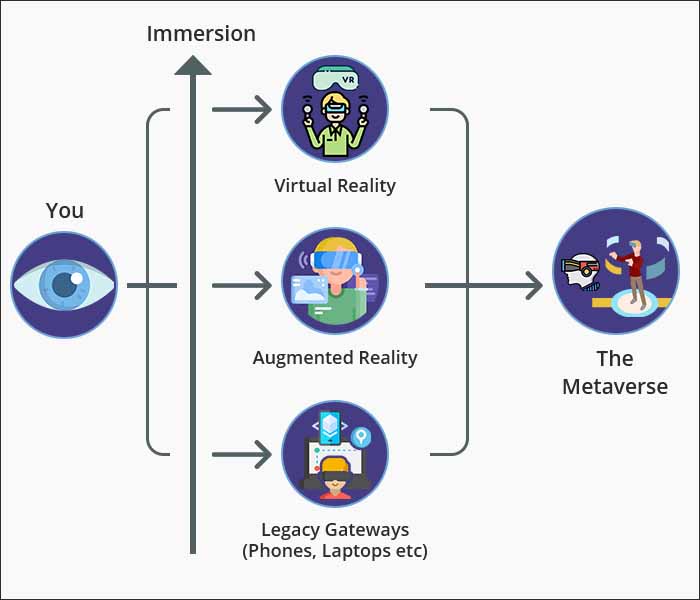Here’s all you need to know!
Right from man’s mission to colonize Mars all the way to the advent of genetically modified organisms (GMOs) and plants that produce better yields, it is evident that technology around us is evolving at warp speed.
There is one common denominator forming the basis of these advancements in technology which is the need to fuel rapid digital transformation to ease human life. Businesses today are investing more and more in curating technologies that can mitigate human efforts and simultaneously help them in building deeper, more meaningful relationships with each other.
A megatrend that brings this notion to life is the metaverse. Simply put, the metaverse talks about a virtual environment wherein you can live a synchronous life with the help of your avatar. The best analogy that I can think of for the metaverse is that of a game in which you engage in real-life activities instead of bringing down zombies and rash driving super-fast cars.
Where did it come from?
The term “metaverse” was coined by sci-fi writer and somewhat of a soothsayer in my opinion, Neal Stephenson. He used the term “metaverse”, a portmanteau of the words “meta” and “universe,” in his novel titled “Snow Crash” to describe a 3D virtual space where people take form of programmable avatars to interact with each other.
The metaverse, as imagined by Stephenson, is a metaphor for the real world.
While the idea of bridging the gap between the real world and a virtual one is not entirely new, it is Stephenson’s idea that really proved to be a touchstone for tech visionaries who put it on a pedestal and used it to chalk out a roadmap for the future.
Shortly after Stephenson, Jaron Lanier, American musician, and computer scientist, introduced the world to the virtual reality musical instrument (VRMI) which he used in his performance of the “Sound of One Hand” in Chicago.
In 2000, Gartner coined the term “supranet” – a convergence of the physical and virtual worlds in the Internet Age.
The last two decades saw an acute rise in the number of sci-fi novels and movies, of course, coupled with a plethora of technological advancements, and now we cut to 2022 wherein metaverse as a concept has exploded and managed to create an utmost eagerness amongst all of humankind.
Where is it today?
While you read my blog today, the metaverse is rapidly evolving into a decentralized collection of virtual worlds. Tech giants are tapping into the full potential of the metaverse with advancements such as:
Augmented Reality (AR) glasses- Google was one of the first companies in the world to delve into manufacturing AR glasses that displayed information on a small screen placed on the right side of your vision with the help of a Wi-Fi or Bluetooth connection. While a series of complications caused their initial efforts to fail, their second edition of AR glasses designed for hands-free operation in enterprises received good traction in the logistics and manufacturing industries.
Virtual Reality (VR) headsets- VR offers an immersive experience through headsets wherein you are equipped with a wide field of vision that gives you unique visual fidelity. With a VR headset, you can easily be transported to your desired version of reality (it’ll be Willy Wonka’s Chocolate Factory for me for sure) and interact with elements in those environments.
Mixed Reality (MR)- MR takes your everyday AR and VR a notch ahead to blur the difference between what’s real and what isn’t. MR utilizes two types of gadgetry- a holographic device that creates digital objects and places them in a real environment in such a way that they appear to really be there, and immersive devices that help conceal elements of the real world by replacing them with digital creations.
Facebook’s Meta and other such projects- Companies like Facebook have invested heavily in AR and VR with a maximized vision of bringing the metaverse, ironically, to life. By leveraging connective technologies including cognitive engineering and Big Data, projects like Meta revolve around the principle of embodying experiences by directly putting you in the content as opposed to just viewing it. The epitome of our tech capabilities!

Where will it go from here?
The metaverse is on its way to becoming a far more immersive and collaborative experience than the online experiences of today. With an underpin of cutting-edge technologies such as Artificial Intelligence (AI) and Blockchain, the metaverse will have a profound impact on how humans interact with each other.
Here are some advantages that you may be able to avail with the metaverse:
- Solving the challenges of remote and hybrid working as well as creating more meaningful experiences with friends and families from remote locations
- Engaging in immersive purchasing experiences with the ability to assess before buying
- Availing ease in conducting monetary transactions, especially with digital currencies and non-fungible tokens (NFTs) with an assurance of security
- Garnering powerful insights across different fields in science and technology through collaborative research on a global scale, thus bringing innovation within the realms of healthcare
- Tapping into different experiences across the world without limitations through virtual tourism in a cost-effective manner
As businesses venture into the metaverse space, its transition into the mainstream looks inevitable. With its ability to accelerate accessibility and communication, it is clear that the metaverse has the potential to transform virtually every industry and change the way we perceive reality.
A successor to mobile internet, the metaverse is no longer a concept straight out of a sci-fi movie. It is only a matter of years before we see it being used in ways that are incomprehensible to us right now.
Reach out to us to at Nitor Infotech to learn more about how your business can benefit from leveraging innovative technologies such as AI and Blockchain in your processes and equip yourself for an imminent digital transformation.





No comments:
Post a Comment